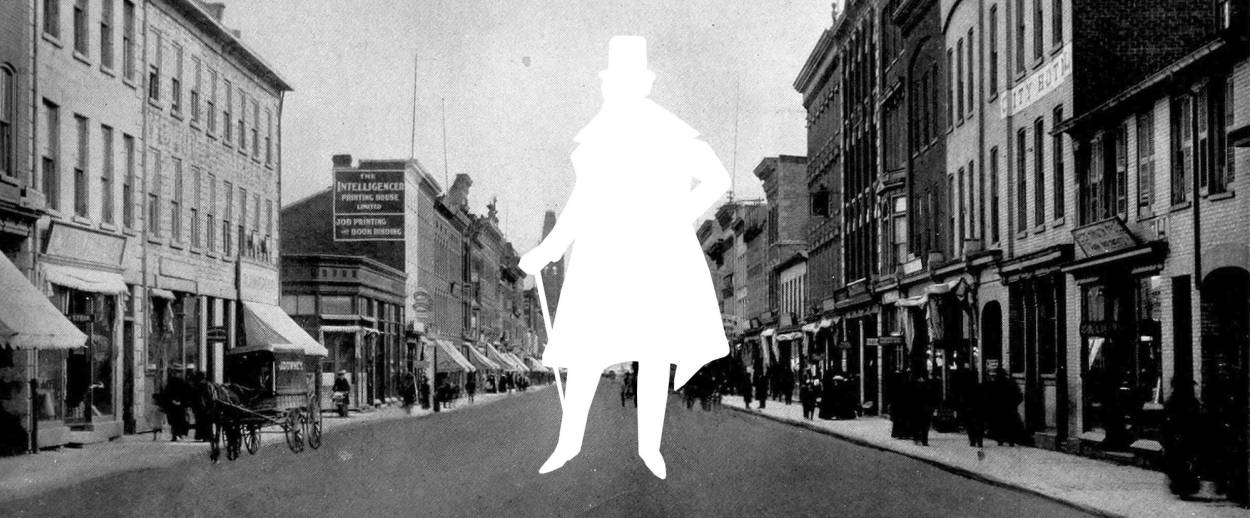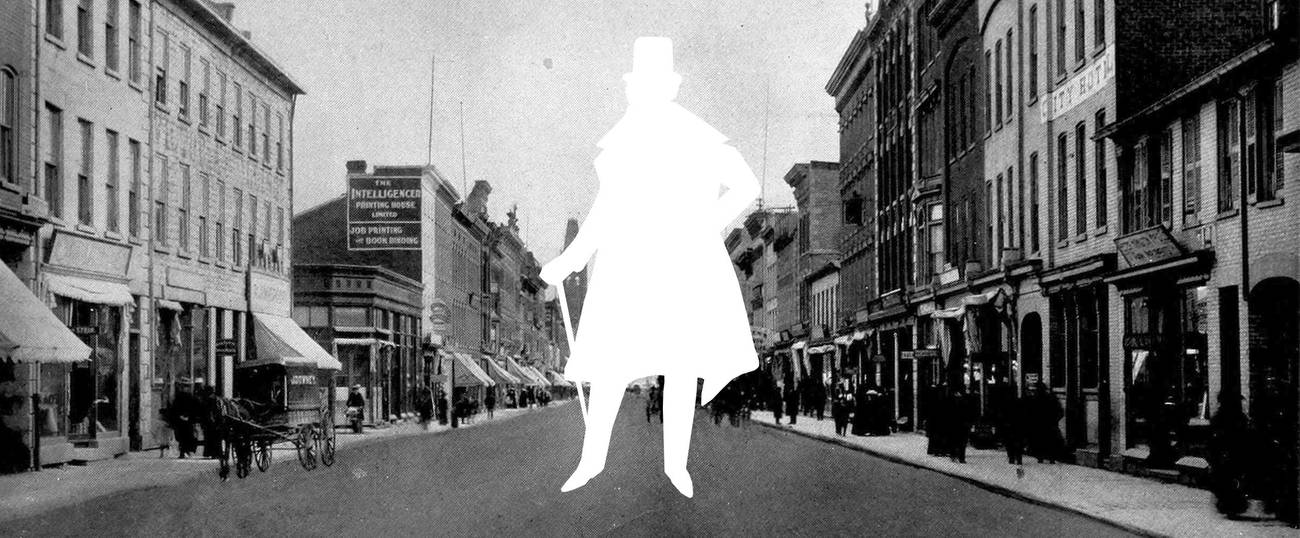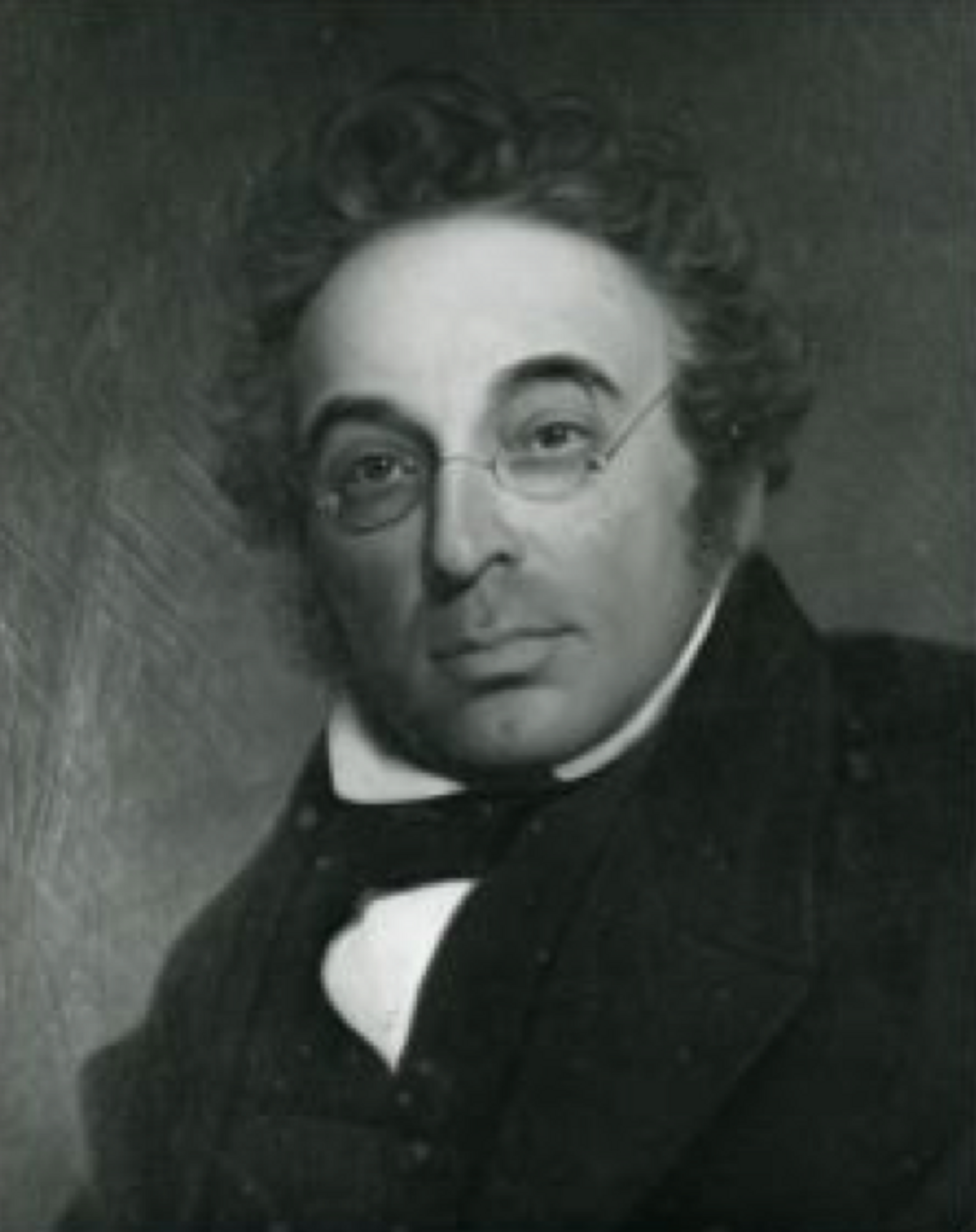The Man Who Made Jewish History in Canada—Twice—and Was Then Forgotten
George Benjamin broke barriers as an elected official, newspaper editor, and leader of a Protestant organization




George Benjamin made Canadian history twice. In 1836, he won election as a clerk of the Thurlow Township, encompassing the town of Belleville, more than 100 miles east of Toronto, becoming the first Jew elected to a municipal office in Canada. And two decades later, in 1856, he was elected to the Province of Canada’s Legislative Assembly as a Conservative supporter of John A. Macdonald, soon to be the first prime minister of Canada. (The Province of Canada included present-day Quebec, known then as Canada East, and Ontario, called Canada West, from 1840 until Canadian Confederation in 1867.) “Benjamin was the first Jew to be elected to the Canadian parliament,” as his biographers Sheldon and Judith Godfrey put it in their 1991 book, Burn This Gossip.
At the time of Confederation, there were slightly fewer than 1,200 Jews in Canada, mainly British and German in origin. They had integrated themselves into Canadian society as much as was possible for a minority who were then tolerated, though not entirely welcome. A handful had become active in local politics, but none were arguably as prominent as Benjamin. The curious thing about Benjamin, however, was that he spent his entire adult life eschewing and concealing his Jewish roots. In fact, Benjamin’s biography included in Volume XI of the Dictionary of Canadian Biography, which was published in 1976, omitted the fact that he was Jewish altogether.
By all accounts, he had next to nothing to do with the Jewish communities in Montreal, Toronto, or anywhere else for that matter, with the exception of making a modest financial donation in 1835 toward the building of the new Shearith Israel synagogue (the Spanish and Portuguese Synagogue) in Montreal. Although he lived as a Christian, as much as was possible at the time, Benjamin’s numerous critics and political opponents did not hesitate to bring up his Jewish background. For him, this was bothersome and occasionally aggravating, but the taunts did not impede his career. Yet in private, at least, he could not quite let go of his past and heritage either: One of his most prized possessions was a Hebrew prayer book in which he kept a record of his life and the birth of his children.
*
Benjamin’s peculiar journey started in Brighton, England, where he was born as Moses Cohen in 1799 to a family with Sephardic ancestry. His parents, Emanuel and Hannah, raised their 12 children in Brighton’s small Jewish community. Emanuel became the city’s shochet, or ritual slaughterer, so that the Jewish families, including his own, would have kosher meat to eat.
Young Moses believed that being a Jew was an obstacle to his future success—not an entirely incorrect conclusion to hold in early 19th century England, where Jews were subjected to many professional and social restrictions. Hence, in 1822, a year after his father’s death and after moving to Liverpool, Moses Cohen became George Benjamin, taking his mother’s maiden name. (It is debatable, of course, whether taking a Jewish surname such as Benjamin made him any less Jewish in the eyes of the gentiles he encountered.) As if to underline this identity change, he joined the Orange Order, a conservative secret society named in honor of Protestant hero King William III, Prince of Orange, who had vanquished the Catholic King James II at the Battle of the Boyne in 1690. The anti-Catholic Order advocated the “power and principles of the Christian religion” and the supremacy of the English Crown.
With his new name, he immigrated to the United States and lived for a time in North Carolina. In 1832, at the age of 33, he met and married Isabella Jacobs, a Jewish girl who was a few months shy of her 13th birthday, a young bride even for those days. Isabella was also likely pregnant at their wedding, as she gave birth to the first of their 14 children—12 of whom survived to adulthood—in November of that year.
Benjamin brought Isabella and their first child to Toronto in 1834. Able to speak six languages including Hebrew, a fact that he did not hide in advertisements, he set up shop as a private tutor, though quickly determined that he could not attract a sufficient number of clients. He and his family then relocated to Belleville, a town of 1,000 people that included Thurlow Township, on the recommendation of a new friend, lawyer James Hunter Samson, a Belleville resident who was a member of the Upper Canadian assembly.

Both men shared a conservative outlook. Given Benjamin’s interest in the Orange Order, an organization that stood for British tradition and heritage, he never wavered in his support for the Tories in their many battles with the Reformers—whether they were moderate like Robert Baldwin, who fought for “responsible government” (in which the prime minister and his government were “responsible” to the elected representatives of the people) or more radical like journalist William Lyon Mackenzie, the first mayor of the newly incorporated city of Toronto in 1834 and the leader of the Upper Canadian rebellion three years later. (Mackenzie envisioned a more republican-style government, as in the U.S.) During the brief conflict, Benjamin volunteered in the local militia and fought against the rebels. With Samson’s encouragement, Benjamin established Belleville’s first newspaper, the weekly Intelligencer. He soon hired as his apprentice young Mackenzie Bowell, who shared his affinity for the Orange Order. Bowell eventually became Benjamin’s partner, then the sole owner of the newspaper, a member of parliament in the first election after Confederation, and in late 1894, the fifth prime minister of Canada.
George and Isabella and their ever-growing family fit into the slow pace of life in Belleville. Their Jewish background was not conspicuous: It is unlikely that Benjamin’s sons were circumcised, and Isabella certainly did not keep kosher. The newspaper business provided Benjamin, who continually put on weight, with a modest living and a small-town visibility, which enabled him to become involved in municipal and provincial politics. As the paper’s publisher-editor, Benjamin was as partisan and spiteful as the custom of the day dictated. He definitely was not shy about sharing his many opinions, slanted in favor of the Tories, and cared little if what he wrote riled his Reform rivals—which was his intent. He did not publicize the fact that he was Jewish, though it was commonly known.
In April 1836, a group of critics who were angered by one of Benjamin’s editorials—probably one he had written against the work of prohibitionists who wanted to ban alcohol— hung Benjamin in effigy outside his office door. Benjamin was not troubled by this until Dr. John Barker, the editor and publisher of the Kingston British Whig, a Reform newspaper, decided to have some fun at Benjamin’s expense. About a week after the effigy hanging, Barker published a ditty titled “On the execution of the Belleville Jew.” It began:
Oh ladies and gentlemen,
While I’ve nothing to do,
I’ll just sing a song
About the Belleville Jew.
The 14-stanza poem, riddled with sarcasm and impudence, derided the Intelligencer as the “Belleville Smut-machine” and denounced Benjamin as the “Jew Benjie” and the “Saintly Belleville Jew” whose demise was not because of the hanging, but because he ate pork. “For pork’s the meat Jews must not eat,” Barker wrote. “No doubt it killed the Jew.” Needless to say, Benjamin was furious about the attack, yet there is no way of knowing how or if he responded to Barker since the early editions of the Intelligencer have been lost. This was not the last time that a detractor would use his Jewish background to insult him.
None of the few hundred (Christian) voters who selected Benjamin as the clerk of Thurlow Township appear to have been troubled that he was a Jew. But as far as can be determined, the small Jewish communities in Montreal, Toronto, and elsewhere, which by 1840 totaled only about 160, did not acknowledge Benjamin’s electoral achievement since they probably did not regard him as one of their own. Moreover, in those days, Belleville was fairly isolated, and it is doubtful whether news of his election or the negative treatment of him would have been widely publicized. There was no Jewish press in Canada until the early 20th century.
The celebrated 19th-century Canadian author Susanna Moodie is still revered for her vivid narrative of the backbreaking challenges of pioneer life in Upper Canada, most notably in her classic book Roughing It in the Bush published in London in 1852. Moodie was creative, bright, broad-minded, and openly opposed slavery. But she also had a nasty temper and was highly protective of her husband, J.W. Dunbar Moodie.
In 1841, Dunbar was the sheriff for Victoria District, which at the time incorporated Belleville, where the Moodies lived, having left their life on the farm seven years earlier for the comforts of a house in the town. During the election campaign for the legislative assembly held that year, there was a contentious and bitter battle between the Tory candidate Edmund Murney and Robert Baldwin for the Reform faction. Voters then cast their ballots publicly, which increased the tension on election day. Sheriff Moodie acted as the impartial returning officer, though he was perceived by the Tories and Benjamin to have been biased in favor of Baldwin, the winner. In a subsequent editorial, Benjamin accused Moodie of “intimidation, perjury, and partiality.” This accusation stung Moodie, who lost his job as returning officer, an outcome that infuriated his wife, Susanna. They both blamed Benjamin, “the little Jew,” as Dunbar referred to him in his correspondence with Baldwin.
Susanna Moodie got her revenge in a four-part story titled “Richard Redpath: A Tale,” which she wrote in 1843 for the Literary Garland, a popular magazine published in Montreal. In the story, which partly takes place in Jamaica, there is a Shylock-like character named Benjamin Levi, “the Jew editor” of the Jamaica Observer. She made little effort to hide the fact that Levi was modeled on George Benjamin, as Moodie readily admitted later to her London publisher Richard Bentley when the story reappeared in her 1854 collection Matrimonial Speculations. “The Jew Editor is a true picture drawn from life,” she explained, “which so closely resembles the original that it will be recognized by all who ever knew him, or fell under his lash, a man detested in his day and generation.”
That was certainly true. Nothing was off limits, particularly ridiculing Benjamin’s girth. In the slightly edited version of the story she used in 1854, the character Benjamin Levi “resembled a puncheon set upon two short, fat, dumpy legs. His shoulders, head, and neck were unusually large, and possessed that determined air of ferocious obstinacy, which generally characterise a savage bull. … There was the cunning, sinister eye, the large aquiline nose, wide mouth, and long white teeth, so common to his people. But in his case, these features instead of being sharp and well-defined were coarse and vulgar.” A “perpetual grin, severed his red, pursed-up lips, which meant for a smile, was but an acquired contortion, to hide the evil workings of the evil spirit within.” Levi, she wrote, loved “prying into the affairs of others” which in her view “was a prominent trait in the Jew’s character.” His newspaper was described in the way Moodie felt about the Intelligencer: “a worthless vehicle for party strife … a perfect sink of iniquity; a receptacle for all that was low in morals and base in practice.” It was a paper for “the most malicious slanders … falsehoods and artful insinuations.”
As was the case with Barker’s attack on him in the British Whig, Benjamin must have been incensed by Moodie’s humiliating and anti-Semitic depiction of him and the emphasis on his Jewish background. But there is no record of any rebuttal he might have made. Though he had a thick skin, essential if you wanted to survive long as a 19th-century newspaper publisher, he likely hoped that the issue would eventually fade and be forgotten.
In 1846, Benjamin became grandmaster of the Orange Lodge—likely the only known Jew to hold such a position in the Protestant organization. His fellow Orangemen must have known he was technically Jewish, yet it made no difference to either them or him. Nor was he troubled that the opening and closing prayers at Orange Lodge meetings included paying homage to “Jesus Christ our Lord and Savior.” In 1848, Benjamin sold the Intelligencer to Mackenzie Bowell and Rodney Moore, Bowell’s brother-in-law. For a time, Benjamin was an agent for the Bank of Montreal. He eventually accepted several municipal appointments before winning a seat in the Province of Canada assembly in 1856 as a loyal supporter of John A. Macdonald.
“He was the first Jew whose right to be seated in a British North American legislature was not contested,” the Godfreys explain in Burn This Gossip: A few other Jews had won legislative elections in Canada earlier in the 19th century, but were prevented from serving due to anti-Jewish prejudice and, more significantly, a narrow interpretation of British constitutional law regarding the oath of abjuration—swearing an oath “upon the true faith of a Christian”—required of non-Christians before they could sit in Colonial-era assemblies. By 1850s, the legal restriction on the oath had been eliminated, permitting Jews and dissenters to serve. When Benjamin won the election in the constituency of Hastings North, which incorporated Belleville, voters knew he was a Jew. But as the Godfreys write, he “swore his oath as a member of the assembly ending with the words ‘so help me God.’ He did not swear the oath of abjuration, nor was he asked to.”
By the time Benjamin was 60 years old in 1859, he found the travel between Belleville and Quebec City, where the assembly was then convening its sessions, and the long absences from his family to be a grind. He kept telling Macdonald that he planned to retire; he never did because the wily Macdonald strung Benjamin along by promising him a cushy partisan appointment that never materialized. After a Conservative government was defeated in May 1862, the governor general asked John Sandfield Macdonald, a leading Canada West Reformer with an independent streak, to form a government with his Canada East partner Louis-Victor Sicotte. Sandfield Macdonald, who was later the first premier of Ontario, recognized talent and approached Benjamin about becoming minister of finance. The offer was tempting, yet Benjamin could not betray John A. Macdonald and the Tories and he turned Sandfield Macdonald down. Had he not done so, as the Godfreys point out, Benjamin would have become “the first Jewish cabinet minister in Canada, 107 years before a Jew [Liberal Herb Gray in 1969] actually became a member of a Canadian cabinet.”
Benjamin’s political career ended in 1863 when he decided not to stand for election again. By then, most of his children had been baptized. Nine months before he died in September 1864, to ensure that he and Isabella would be buried in Belleville’s St. Thomas’ Anglican Church cemetery, the two were also baptized. His brief obituary in the Toronto Globe (later the Globe and Mail), the most widely read newspaper of the period, made no mention that he was born a Jew. Other Jewish politicians of this era—Samuel Benjamin, who was elected an alderman in Montreal in 1849; Selim Franklin, a member of the Vancouver Island legislature in 1860; and British-born Henry Nathan, Jr. of Victoria, the first Jew elected to the House of Commons in 1872— did not feel the need to go to such lengths. George Benjamin, who had willingly abandoned his Jewish identity, however, was not the last Jew to believe that being Jewish was a barrier that had to be eliminated in order to enjoy a perfect life.
***
Like this article? Sign up for our Daily Digest to get Tablet Magazine’s new content in your inbox each morning.
Historian and writer Allan Levine’s most recent book is Details Are Unprintable: Wayne Lonergan and the Sensational Café Society Murder.